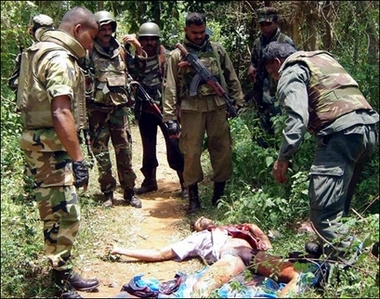Ilankai Tamil Sangam29th Year on the Web Association of Tamils of Sri Lanka in the USA |
|||
 Home Home Archives Archives |
Foreign Aid Cut Fears as Sri Lanka Fails on Human Rightsby Amal Jayasinghe, AFP, May 13, 2007
A top US envoy left Colombo on Thursday after castigating the government of President Mahinda Rajapakse for not delivering on promises to reduce violence while Britain also froze debt relief to its former colony. Japan, Sri Lanka's largest single aid donor, was also planning to meet with international activists who are demanding the linking of aid to the island's human rights record, a diplomat, who declined to be named, said. Human Rights Watch said it was encouraging Japan to be more pro-active in Sri Lanka. "We expect them to take a leadership role in pushing Sri Lanka's government to end human rights violations," a spokeswoman for the New York-based rights group said. The visiting US official, Richard Boucher, echoed the concerns of Sri Lanka's key aid donors last week. "People are more fearful and face more difficulties," said Boucher, the US assistant secretary of state for Central and South Asian affairs. "Overall there has been a deterioration in Sri Lanka's human rights record." During his three-day visit, Boucher visited the besieged Jaffna peninsula where extra-judicial killings are rampant and heard the complaints of minority Tamils. More than 700 people are reported to have "disappeared" in the past year amid worsening fighting between troops and Tiger rebels. The spiralling violence in the former British colony sparked a debate in the House of Commons earlier this month with calls for international human rights monitoring. British International Development Minister Gareth Thomas announced a freeze on aid to Sri Lanka, following a similar moved by Germany. Sri Lankan Foreign Minister Rohitha Bogollagama shrugged off the aid freeze by Britain, saying the amount of money involved was about three million dollars and was too insignificant to "bother about." But promises Bogollagama made in foreign capitals about Sri Lanka's plans for a political settlement to the island's drawn-out Tamil separatist conflict are beginning to dog him and the administration. In February, he told Indian leaders that a power-sharing plan would be unveiled in April. The promise was repeated when he met with US Secretary of State Condoleezza Rice in March. However, there has been no firm power-sharing plan announced by the government. Instead, on May 1, the ruling party put out draft proposals which were immediately shot down by the government's own allies and Tamils. Pro-government Tamil political leader Dharmalingam Sithadthan said the outline of the government's plan was unacceptable even to moderates who have been supporting the government while opposing Tamil separatists. "No one can support the draft proposal because it takes away even what little has been offered under the present system," Sithadthan said. The ruling party draft proposes a smaller administrative unit than the provincial councils which have operated in the country of 19.5 million people since 1987, in line with a peace deal arranged by neighbouring India. The Tamil rebels have already rejected even the provincial council system as inadequate, saying it fails to give political autonomy to the 12.5 percent ethnic Tamil minority. Rajapakse discussed the political reforms with Boucher, a spokesman for the president's office said, adding no time frame was set for a final solution as an all-party committee debated the issue. The Norwegian-backed peace efforts began unravelling in December 2005 when the Tamil Tigers and government forces began their latest wave of fighting, ignoring a truce put in place in February 2002. More than 4,800 people have been killed in fighting since Norwegian-brokered peace talks collapsed in October 2005. The conflict which erupted in 1972 has claimed more than 60,000 lives.
| ||
 Sri Lanka's failure to share power with minority Tamils and put an end to extra-judicial killings have raised prospects of more aid cuts to the embattled island, officials and diplomats say.
Sri Lanka's failure to share power with minority Tamils and put an end to extra-judicial killings have raised prospects of more aid cuts to the embattled island, officials and diplomats say.